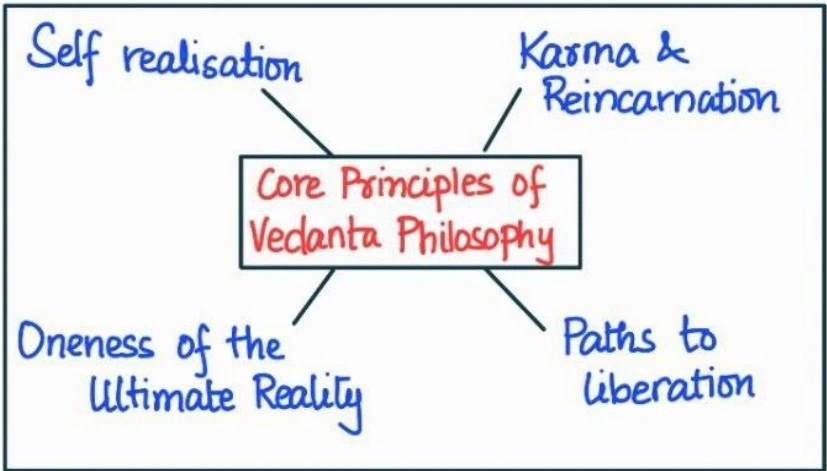Answer:
|
How to approach the question
- Introduction
- Write briefly about Vedic philosophy
- Body
- Explain the core principles of Vedanta philosophy
- Highlight the impact of Vedanta philosophy on spiritual practices, social structure, and cultural traditions
- Conclusion
- Give appropriate conclusion in this regard.
|
Introduction
Vedanta philosophy or Uttara Mimansa is rooted in ancient Hindu scriptures called the Vedas, founded by Adi Shankaracharya and upholds the philosophy of life elaborated in Upanishads. As per vedanta philosophy, Brahman is the ultimate reality, without a second, beyond space and time, name and form, without beginning or end.

Core principles of Vedanta philosophy
- Oneness of the Ultimate Reality: Just as different rivers originate from different sources but ultimately merge into the vast ocean, individuals may have unique identities but are ultimately connected.
- Self-Realisation: Vedanta emphasises the realisation of one’s true self or Atman, which is considered identical to the ultimate reality known as Brahman. Example- Swami Vivekanand observed, “In the west, if a man doesn’t believe in God, he is considered an atheist, whereas vedanta says that a man who doesn’t believe in himself is an atheist.”

- Karma and Reincarnation: Vedanta recognizes the law of karma, which states that every action has consequences just as a person reaps what he/she sows.
- Paths to Liberation: Vedanta recognizes different paths to spiritual liberation, such as Jnana (knowledge), Bhakti (devotion), Karma (selfless action), and Raja (meditation).
Impact of Vedanta philosophy on spiritual practices, social structure, and cultural traditions –
- Six sub-schools of Vedanta : The philosophy gave birth to six sub-schools.
- Spiritual Practices: Practice of Advaita Vedanta, a non-dualistic philosophy, encourages seekers to realise their oneness with the ultimate reality, transcending dualities and experiencing unity with the divine.
- Social Structure: Swami Vivekananda, a prominent Vedantic thinker, spoke against the notion of caste-based discrimination and worked to promote equality and social upliftment.
- Cultural Traditions: Chanting of Vedic hymns and mantras during religious rituals and the recitation of Upanishadic verses during spiritual discourses reflect the influence of Vedanta on cultural traditions.
- Synthesis of Paths: The integration of Bhakti Yoga (path of devotion) with Vedanta has led to the popularity of devotional practices and the worship of deities in Hindu traditions.
Conclusion
Vedanta philosophy has left an indelible mark on spiritual practices, social structure, and cultural traditions by influencing concepts of self-realisation, social equality, ethical values, the synthesis of paths, and fostering a universal outlook.
To get PDF version, Please click on "Print PDF" button.



https://uploads.disquscdn.com/images/b687830fe2ae8fa2fd0a31f8d701cd05d3ff03101ccca623091b399a607915d2.jpg https://uploads.disquscdn.com/images/95edd0533048509d5417831257c9493e443dba2ac37ad719c74b866851c24829.jpg
https://uploads.disquscdn.com/images/83afbf2aa035b356c59b64c53f5744262e44f63f4a42ef5b58a5faeb0b4c2d13.jpg https://uploads.disquscdn.com/images/7621742f2881c3895eded542c235e7ef85c29157e84ea4b6d65095cf5e51f1d2.jpg
https://uploads.disquscdn.com/images/190e0a79f6bf4c455d7546ea6ec5127bb201a50fd4ddf924ba3e894530c28351.jpg https://uploads.disquscdn.com/images/ff361b6882b7dc3fcda52bc8b7fc25983bfa074ad732c932d3a21d29098c7014.jpg